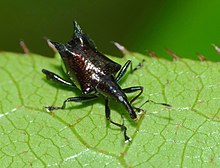Scolopterus penicillatus
Scolopterus penicillatus, also known as the black spined weevil, is an endemic beetle of New Zealand.[2] The beetle is present throughout New Zealand and can be discovered by beating native flowering plants in the summer months.[2] In appearance it is a shining black colour with a purplish tinge and looks very similar to its close relative Scolopterus tetracanthus. S. penicillatus can be distinguished from S. tetracanthus as the spines on the shoulders of the former are much less pointed.[2] Adult black spined weevils have been collected from Hedychium gardnerianum[3] and caught in the flowers of Helichrysum lanceolatum.[4] The larvae of S. penicillatus are known to develop in the recently dead bark of the various species of Pseudopanax.[5]
| Scolopterus penicillatus | |
|---|---|
 | |
| Scientific classification | |
| Kingdom: | |
| Phylum: | |
| Class: | |
| Order: | |
| Family: | |
| Genus: | |
| Species: | S. penicillatus |
| Binomial name | |
| Scolopterus penicillatus | |
References
| Wikimedia Commons has media related to Scolopterus penicillatus. |
- "Scolopterus penicillatus White, 1846". New Zealand Organisms Register. Landcare Researc. Retrieved 2 May 2016.
- Manson, D. C. M. (1960). Native Beetles of New Zealand. Wellington: A. H. & A. W. Reed. p. 15.
- Winks, C. J.; et al. (2007). Invertebrates and Pathogens Associated with Wild Ginger, Hedychium gardnerianum and Hedychium flavescens (Zingiberaceae), in New Zealand (PDF) (Report). Landcare Research. p. 35. Retrieved 2 May 2016.
- Heine, E. M. (1937). "Observations on the pollination of New Zealand flowering plants" (PDF). Transactions and Proceedings of the Royal Society of New Zealand. 67 (2): 139. Retrieved 2 May 2016.
- May, Brenda M. (1993). "Larvae of Curculionoidea (Insecta: Coleoptera): a systematic overview" (PDF). Fauna of New Zealand. 28: 76. Retrieved 2 May 2016.